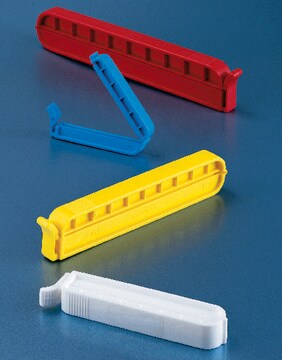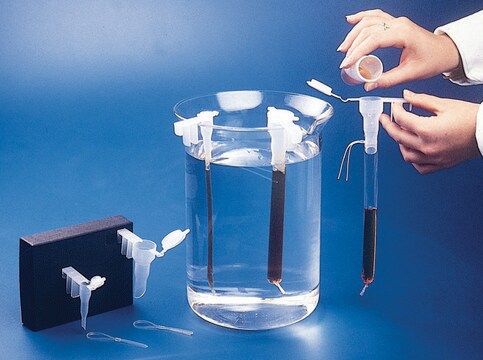D9402
Dialysis tubing cellulose membrane
avg. flat width 76 mm (3.0 in.)
Sign Into View Organizational & Contract Pricing
All Photos(1)
About This Item
UNSPSC Code:
41123100
NACRES:
NB.22
Recommended Products
avg. diam.
49 mm , when full
avg. flat width
76 mm (3.0 in.)
capacity
~640 mL/ft
Looking for similar products? Visit Product Comparison Guide
Related Categories
General description
Typical molecular weight cut-off = 14,000.
Packaging
Supplied in rolls, dry
Quality
May contain glycerin and sulfur compounds in more than trace amounts.
Preparation Note
Removal of glycerol included as a humectant can be accomplished by washing the tubing in running water for 3-4 hours. Removal of sulfur compounds can be accomplished by treating the tubing with a 0.3% (w/v) solution of sodium sulfide at 80°C for 1 minute. Wash with hot water (60°C) for 2 minutes, followed by acidification with a 0.2% (v/v) solution of sulfuric acid, then rinse with hot water to remove the acid. This tubing will retain most proteins of molecular weight 12,000 or greater.
Storage Class Code
11 - Combustible Solids
WGK
WGK 3
Flash Point(F)
Not applicable
Flash Point(C)
Not applicable
Choose from one of the most recent versions:
Certificates of Analysis (COA)
Lot/Batch Number
Don't see the Right Version?
If you require a particular version, you can look up a specific certificate by the Lot or Batch number.
Already Own This Product?
Find documentation for the products that you have recently purchased in the Document Library.
Customers Also Viewed
Stavroula Nanaki et al.
Polymers, 12(4) (2020-04-11)
In the present study, novel block copolymers of poly(l-lactide)-block-poly(propylene adipate) (PLLA-b-PPAd) were synthesized in two ratios, 90/10 and 75/25 w/w and were further investigated as long-acting injectable (LAI) polymeric matrices in naltrexone base microparticle formulations. The synthesized polymers were characterized
Di Wu et al.
Archives of oral biology, 120, 104930-104930 (2020-10-16)
The aim of this study was to investigate the role of microRNA-152-3p (miR-152-3p) in the osteogenic differentiation of human periodontal ligament stem cells (hPDLSCs). HPDLSCs were isolated and identified using immunofluorescence staining, and their osteogenic differentiation capability was evaluated by
Chiara E Ghezzi et al.
Biomaterials, 35(24), 6236-6247 (2014-05-14)
Airway tracts serve as a conduit of transport in the respiratory system. Architecturally, these are composed of cartilage rings that offer flexibility and prevent collapse during normal breathing. To this end, the successful regeneration of an airway tract requires the
Related Content
Dialysis Tubing
Our team of scientists has experience in all areas of research including Life Science, Material Science, Chemical Synthesis, Chromatography, Analytical and many others.
Contact Technical Service



